【1-60天】雅思口语常见170问和常用72句型
雅思口语考试的常见话题
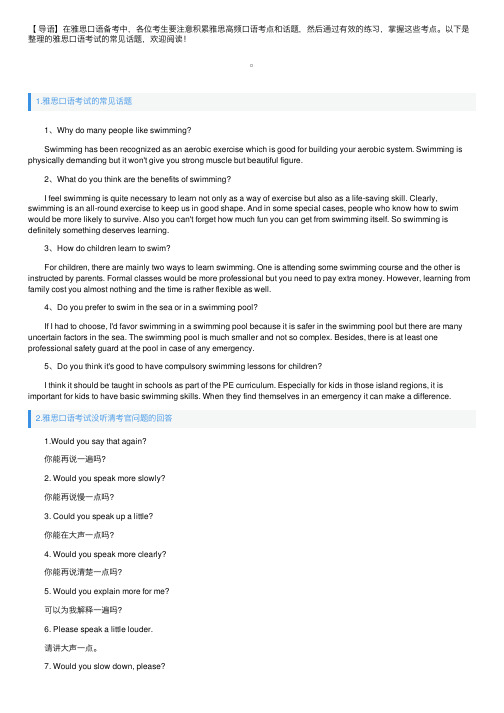
【导语】在雅思⼝语备考中,各位考⽣要注意积累雅思⾼频⼝语考点和话题,然后通过有效的练习,掌握这些考点。
以下是整理的雅思⼝语考试的常见话题,欢迎阅读!1.雅思⼝语考试的常见话题 1、Why do many people like swimming? Swimming has been recognized as an aerobic exercise which is good for building your aerobic system. Swimming is physically demanding but it won't give you strong muscle but beautiful figure. 2、What do you think are the benefits of swimming? I feel swimming is quite necessary to learn not only as a way of exercise but also as a life-saving skill. Clearly, swimming is an all-round exercise to keep us in good shape. And in some special cases, people who know how to swim would be more likely to survive. Also you can't forget how much fun you can get from swimming itself. So swimming is definitely something deserves learning. 3、How do children learn to swim? For children, there are mainly two ways to learn swimming. One is attending some swimming course and the other is instructed by parents. Formal classes would be more professional but you need to pay extra money. However, learning from family cost you almost nothing and the time is rather flexible as well. 4、Do you prefer to swim in the sea or in a swimming pool? If I had to choose, I'd favor swimming in a swimming pool because it is safer in the swimming pool but there are many uncertain factors in the sea. The swimming pool is much smaller and not so complex. Besides, there is at least one professional safety guard at the pool in case of any emergency. 5、Do you think it's good to have compulsory swimming lessons for children? I think it should be taught in schools as part of the PE curriculum. Especially for kids in those island regions, it is important for kids to have basic swimming skills. When they find themselves in an emergency it can make a difference.2.雅思⼝语考试没听清考官问题的回答 1.Would you say that again? 你能再说⼀遍吗? 2. Would you speak more slowly? 你能再说慢⼀点吗? 3. Could you speak up a little? 你能在⼤声⼀点吗? 4. Would you speak more clearly? 你能再说清楚⼀点吗? 5. Would you explain more for me? 可以为我解释⼀遍吗? 6. Please speak a little louder. 请讲⼤声⼀点。
雅思 口语 必背 精简

1. What do you think are the main causes of road accidents?2. Do you know what to do in case of emergency?3. Does your name have any special meaning?4. Where were you come from?5. What kind of landscape surrounds your hometown?6. Will your life change a lot after you immigrate to ABC?7. What is the difference between Beijing and your hometown?8. What are the main places of interest in your hometown?9. What is the climate like in your hometown?10. What is the character of the people like in the region where you live?11. What are the differences in accent between the people of your hometown and Beijing?12. What is people"s favorite food in your region?13. How do you make dumplings?14. What do you do during the Spring Festival?15. Why is the Spring Festival so important to Chinese people?16. Can you describe one of the main festivals celebrated in your country?17. Tell me something about the Lantern Festival.18. Tell me something about the Qing Ming Festival.19. Tell me something about the customs of your country.20. How long have you lived in Beijing?21. What is the weather like in Beijing?22. How do you compare the climate in Beijing with that in your hometown?23. What place in Beijing do you like best? Why ?24. Which is the worst place you"ve been to China?25. Which is the best place you"ve been to China?26. What places in Beijing should a foreigner visit? Why?27. What are the major social problems in Beijing? How can they be solved?28. What is the biggest problem China faces?29. What places in Beijing should a foreigner visit? Why?30. Could you tell me something about your family?31. Have you any children?32. What is your child"s name? Does his name have a meaning?33. What does your wife/husband do?34. When did you get married?35. Describe your wedding.36. How have weddings changed in recent years?37. Are there any special customs about wedding in your region?38. Describe a traditional wedding ceremony.39. Where did you go for your honeymoon?40. Did you have to ask for permission from your parents before you got married?41. Is it acceptable for couples to live together without marrying?42. Where do you think a newly couple should live? Living with their parents or on their own?43. What responsibilities should a couple take?44. How do Chinese usually celebrate birthdays?45. Are there any traditions concerning the birth of a baby?46. What kind of parent do you intend to be?47. What do you think of One-Child Policy in China?48. Why do people in China traditionally want to have a son?49. What difficulties do Chinese farmers have concerning their old age?50. What do you think needs to be done in order to relieve the farmer"s worries?51. What hope or fears do you have for your children?52. What sort of culture do you hope your child will grow up in?53. Are you going to bring up your child differently from the way you were brought up? How?54. Do you enjoy shopping?55. Who does most of the shopping in your family?56. What are you good at cooking? What is your favorite dish?57. Who does most of cooking in your family?58. Is there *** discrimination in China?59. How do you sum up women"s conditions in China?60. What are the causes of *** discrimination?61. Should government pay certain salaries to those housewives? Why or why not?62. Would you want your wife to continue with her career or to stay at home taking care of the household after you get married?63. Have you ever wished to be one of the opposite ***? Why (why not)?64. What would you do if your next-door neighbour were noisy nearly all the time?65. Do you have a lot of friend?66. What does friendship mean to you? What kind of people do you make friend with?67. What is your major?68. How do you like your major?69. When and where did you graduate? What qualifications have you obtained?70. Do you still remember your school days?71. What impressed you most when you were at university?72. Which is the best university in your country?73. Could you sum up your own study habits in a few points?74. What do you think of the practice of setting up key schools in primary and secondary school education in China?75. Do you think the subjects you are studying today are relevant to present-day society? Why ?76. What do you think education should be? Should it be a process of learning what is useful for your future life or should it be simply learning for enjoyment? Why?77. What do you do for a living?78. What do you do in the office every day?79. Since your job seems too professional to me, could you explain it in detail?80. What are your job prospects?81. If you had the opportunity to change your job, what would you do with it?82. Do you have any ambitious?83. Will any possible future changes affect your job in any way?84. What are your spare time interests?85. How do you spend your weekends?86. What is your favorite sport? What are the rules?87. What is the most popular sport in your country?88. What are the sporting facilities like in your university/Beijing?89. What do you know about Qigong? Do you believe in Qigong?90. What do you do in your spare time?91. Do you often read newspapers? If not, why ones do you read?92. What do you think of computer?93. Do you think computer has changed our life so much?94. Do you often go to the cinema/theatre?95. What kind of films do you like best?96. Do you often watch TV? What is your favorite program?97. Do you think watching TV too much is a waste of time?98. What kind of music do you enjoy?99. Who is your favorite film star? Will you describe him/her to me?100. Do you enjoy travelling?101. Where have you been travelling to? Which place interested you most? 102. Do you smoking?103. Do you think smoking is a problem that needs special attention and has to be solved? If so, why?104. What do you know about ABC?105. What problem do you think you will have in ABC?106. How will you overcome the difficulties?107. Do you think you will be able to cope with English-demands of your intended study program in ABC?108. What difficulties do you think you’ll encounter in your studies in ABC? 109. Can you imagine what life in Britain/Canada/Australia/London, etc. would be like?110. How will you fare in Britain/Canada/Australia, etc. without your family? 111. What do you intend to study?112. Which university are you going to study at?113. Why did you choose this university?114. Where are you going to study in ABC?115. What are you plans in ABC?116. What is your research proposal all about?117. What do you hope for most from your study abroad?118. Will your study abroad help your job prospects after come back to China? 119. Should you study more theory or do more practice? Give your reasons, please. 120. What kind of differences in the cultures are you expecting between China and the ABC?121. How will your study in Britain benefit your work in China when you come back to China?122. How will your study in Britain benefit your work in China when you come back to China?123. What do you intend to do after you finish studying?124. What will be your main problem when you are study in a foreign country? 125. What problem can you foresee in the future when you come back to China? 126. Will there be any adjustment problems in your life when you come back to China? If so, what are they?127. Will you have to make any changes in your work/life when you come back to China?128. Do you think there will be a gap between your knowledge gained in China and the level of knowledge you are going to encounter on arrival? If so, what will it be? 129. What do you think of the future of China keeps an open policy?130. What do you regard as the most significant events in your country’s recent history?131. Are there any special places you want to see in Canada? What are they? 132. What do you especially want to do in Canada?133. How do you like your life in ABC University?134. What do you think of the training in the university?135. In what way do you think university training is helpful or falls short?136. What aspect of English do you find the most difficult?137. Do you find American English easier to understand than Britain English? 138. What sports are played in your country?139. Could you describe the traditional architecture of your country?140. What role dose religion play in everyday life in your country?141. What would you regard as the most significant events in your country"s recent history?142. How aware do you think people are nowadays about environmental issues? 143. Could you tell me why you chose to study at the university of ABC?144. What role dose tourism play in your country"s economy?145. How serious is unemployment in your country?146. In your opinion, what are the most serious problems associated with modern life?147. What do you think have been the most important changes in your field over the past 5 years?148. What are you going to major in ?149. Are you going to do your own cooking when you are at university?150. Some local students feel that overseas students get preferential treatment. What is your opinion?151. Do you think you will be able to cope with the English-language demands of your intended program?。
2024雅思口语最新60个话题
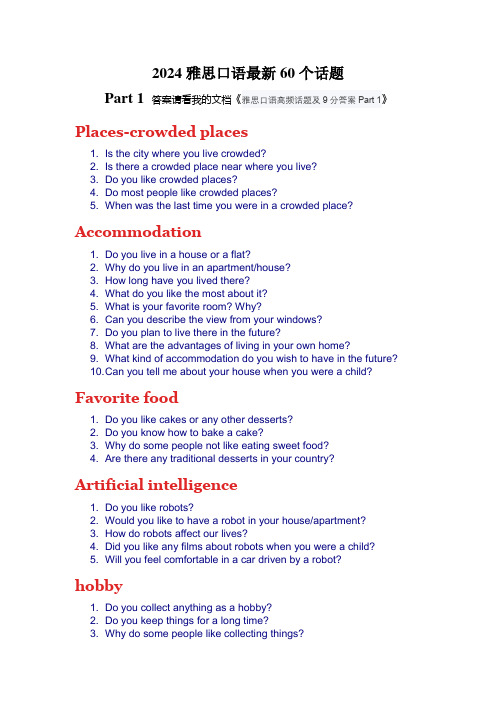
2024雅思口语最新60个话题Part 1 答案请看我的文档《雅思口语高频话题及9分答案Part 1》Places-crowded places1. Is the city where you live crowded?2. Is there a crowded place near where you live?3. Do you like crowded places?4. Do most people like crowded places?5. When was the last time you were in a crowded place? Accommodation1. Do you live in a house or a flat?2. Why do you live in an apartment/house?3. How long have you lived there?4. What do you like the most about it?5. What is your favorite room? Why?6. Can you describe the view from your windows?7. Do you plan to live there in the future?8. What are the advantages of living in your own home?9. What kind of accommodation do you wish to have in the future?10. C an you tell me about your house when you were a child? Favorite food1. Do you like cakes or any other desserts?2. Do you know how to bake a cake?3. Why do some people not like eating sweet food?4. Are there any traditional desserts in your country? Artificial intelligence1. Do you like robots?2. Would you like to have a robot in your house/apartment?3. How do robots affect our lives?4. Did you like any films about robots when you were a child?5. Will you feel comfortable in a car driven by a robot?hobby1. Do you collect anything as a hobby?2. Do you keep things for a long time?3. Why do some people like collecting things?4. Do boys and girls collect the same things?Memory1. What do you have to remember to do every day?2. Is it easy for you to forget to do these things?3. Are you good at memorizing things?4. How do you help yourself to remember things?5. Have you ever forgotten something important?Fish and fishing1. Is fishing popular in your country?2. Do you like eating fish?3. Have you ever been to a place with lots of fish around you?4. Have you ever seen any movies with lots of fish? hometown1. Where is your hometown?2. Do you like your hometown? Why?3. How long have you been living in your hometown?4. Do you believe it is a proper place to grow up? Why5. How could your hometown be improved?6. Has your hometown changed much since you were a child?7. Is there good public transportation in your hometown?8. Will you be moving away from your hometown?color1. What is your favorite color?2. Do you think color is important in your daily life?3. Are there any colors that have a special meaning in your culture?4. Do you usually help people around you?5. How do you help people around you?6. Do your parents teach you how to help others?7. What have you done to help the elderly?gifts1. What gifts do you want?2. Are you good at choosing gifts?3. Have you given other gifts made by you?Getting bored1. Do you often feel bored?2. When would you feel bored?3. What do you do when you feel bored?4. Do you think childhood is more boring or adulthood is more boring? Sunglasses1. Do you often wear sunglasses?2. Do you spend a lot of money on sunglasses?3. Do you give sunglasses as a gift?4. When do you wear sunglasses?Living area1. Where are you living now?2. Do people of different age groups live in your area?3. What do you like most about where you live?4. What is the neighborhood like where you live?5. Do you have any friends there?6. What can be improved in the area where you live?7. Do you know any famous people in the area where you live?8. Do you intend to stay in this area in the future?Running1. Do you like running?2. Where do you run?3. Which places do you think are perfect for running?4. Do you think running is a good way to stay healthy?Social media1. When did you start to use social media?2. Do you think you spend too much time on social media?3. What do people do on social media?Save money1. How do you save money?2. What do you think of e-payment?3. Do you often use credit cards?4. Do you think cash will still be popular in the future?5. Do you like spending money or saving money?music1. Do you know how to play a musical instrument?2. Do you think students should learn to play musical instruments atschool?3. Have you taken any classes on musical instruments in school?4. Which musical instrument do you like?5. How easy would it be to learn to play a musical instrument without ateacher?study1. What subjects are you studying?2. Why did you decide to study those subjects?3. Do you like your subject?4. Do you prefer to study in the mornings or the afternoons?5. Do you miss being a student?6. Is it exciting?7. Are you looking forward to working?8. How much time do you spend on your studies each week?9. Do you want to change your major?10. W hat changes would you like to see in your school?11. W hat work do you do?12. D o you like your job?13. W hy did you choose to do that type of work (or that job)?14. W hat technology do you use at work?15. W ho helps you the most? And How?16. D o you want to change to another job?2024雅思口语题库更新Part 2Describe a place where you can relax.You should say:•Where it is•What it is like•How often you go there•And explain how you feel about this place.Describe an unusual holiday/vacation you had.You should say:•When and where you went•Who you went with•What you did there•And explain why it was unusual.Describe a foreigner who can speak your language well.You should say:•who he/she is•where he/she is from•why he/she can speak your language well•and explain how you feel about this person.Describe an interesting conversation you had with an old person.You should say:•Who this person is•When and where you had the conversation•What you talked about•And explain why you think it was interesting.Describe a time when you helped someone.You should say:•Where you helped him/her•Why you helped him/her•How you helped him/her•And explain how you felt about the experience.Describe a place in your country that you think is interesting.You should say:•where it is•how you knew it•what special features it has•and explain why you are interested in it.Describe an interesting person you never met but would like to know more about him/her.You should say:•who this person is•how you knew him/her•why you think he/she is interesting•and explain how you feel about this person.Describe a job you don't want to do in the future.You should say:•What it is•Where you knew it from•Whether the job is difficult or not•And explain why you don't want to do it.Describe an outdoor activity you did in a new place recently. You should say:•What the activity is•Who invited you to participate in it•Whether you asked for help in the activity•And explain what change you had in the activity. Describe a bad service you received in a restaurant or shop. You should say:•when and where it happened•what happened•how you dealt with it•and explain how you felt about the experience. Describe a time you bought something from a street market. You should say:•When it was•Where it was•What you bought•And how you felt about it.Describe a skill that you learned when you were a teenager. You should say:•What the skill is•Who you learned it from•Why you learned it•Explain how you felt about learning itDescribe a good advertisement that you think is useful.You should say:•where you can see it•what it is about•why you think it is useful•and explain how you feel about it.Describe a uniform you wear (e.g., at school, at work).You should say:•Where you wear the uniform•How long you need to wear it•What it looks like•And explain how you feel about it.Describe a person who has interesting ideas or opinions. You should say:•who this person is•how you knew him/her•what this person does•and explain why you think his/her ideas or opinions are interesting. Describe a travel you were looking forward to but was delayed.You should say:•Where you planned to travel to•Why you were looking forward to it•Why it had to be delayed•And explain how you felt about the experienceDescribe a time when you waited a long time for a nice thing.You should say:•what you waited for•where you waited•why it was special•and explain how you felt while you were waiting.Describe a person you know who likes to talk a lot.You should say:•Who this person is•How you knew this person•What he/she usually talks about•And explain how you feel about him/her.Describe a useful object in your home that you cannot live without.You should say:•What it is•What you can do with it•How often you use it•And explain why you cannot live without it.Describe a beautiful city you have visited.You should say:•where the city is•how you knew the city•what it is famous for•and explain why it is beautiful.2024雅思口语话题汇总Part 31. Do people have enough places to relax in your country?2. What do people usually do when they are relaxed?3. Is physical activity good for relaxation?4. Do you think spending time in front of a screen helps people relax?1. Do you think people in your country have long enough holidays?2. Which holidays are popular in your country?3. What are the differences between old and young people whenspending their holidays?1. When do students in your country start to learn foreign languages?2. What qualities should a language teacher have?3. Do you have any techniques for learning languages?4. Do you think it is faster for children to learn languages than adults?5. How does technology influence language learning?1. How do people have a conversation with an elderly person?2. What can young people learn from old people?3. Do you think old people can work better than young people?4. What are the advantages of having people of different ages living inthe same house?1. Should people be very kind when they help others?2. Should children be taught to be kind to others?3. What kind of advice should parents give to their4. Can children provide any help for parents?1. How can people access travel information?2. Do people have different personalities in different regions of yourcountry?3. What causes the differences between different regions of yourcountry?4. Is an excellent tourist destination also a good place to live?1. Are there any differences in the relationship between you and yourfriends and between you and other people?2. Do people feel lonely in crowded cities?3. Can clothing tell and reveal a person's personality?4. Why do individuals from the same family have differentpersonalities?1. Do you think Al will take over many jobs?2. What would you say are the important factors to be consideredwhen choosing a career?3. Technology will make some people unemployed. How can thisproblem be solved?4. Is it common in your country for people to move to other citiesbecause of work?1. Do people go outdoors more or less now?2. What can people do outdoors besides exercising?3. When do people usually go outdoors to get close to nature?4. What can people do to get close to nature?1. How do most people respond to bad services?2. Do you think most restaurants and shops provide better servicesthan before?3. Why do some people remain silent when receiving bad service?4. What would you do as a boss to prevent bad service?1. Why do some people like to buy luxuries?2. Do you think small markets will disappear in the future?3. What are the differences between shopping in street markets andbig shopping malls?4. Do you think the goods sold at discount stores do not have goodquality?1. Where do children learn skills in your country?2. What are the differences between learning skills on your own andfrom others?3. What important skills should a child learn?4. What skills do you think teenagers should have?1. How do you feel about online advertising?2. Are there any great online advertisements?3. Why does buying new things make people happy?4. Do people still watch useless advertisements nowadays?1. Why should students wear uniforms?2. On what occasion should people wear uniforms?3. What are the advantages and disadvantages of wearing a uniform?4. Should companies ask for employees' opinions about the design ofuniforms?1. How do inventors and philosophers come up with new ideas?2. Do you think children should have their own opinions?3. Why do children often have opinions similar to their parents?4. Do you think teachers influence students' opinions?1. How do people usually go traveling?2. In what ways can traffic conditions in a city be improved?3. Do people still drive a car if public transportation is free of charge?4. How can transportation in rural areas be developed?1. On what occasions do people have to wait for a long time?2. What do people usually do while waiting?3. Why do most children have difficulties waiting for a long time?4. Do people queue consciously while waiting for the subway train? 1. How should parents encourage their children to express themselveswhen being asked questions that they are afraid to answer?2. Why do some children talk more than their peers?3. What kind of professions involve talking to groups of people?1. What equipment do you find difficult to use?2. Why do some people in the workplace dislike technology?3. Why do people buy a lot of household appliances?4. What do people often do with electronic devices?1. What are the differences between modern towns and modern cities?2. Why do some people like to visit historical sites?3. Does historic preservation contradict economic development?4. Who should be responsible for protecting historical buildings?。
雅思口语常见问题和口语模板
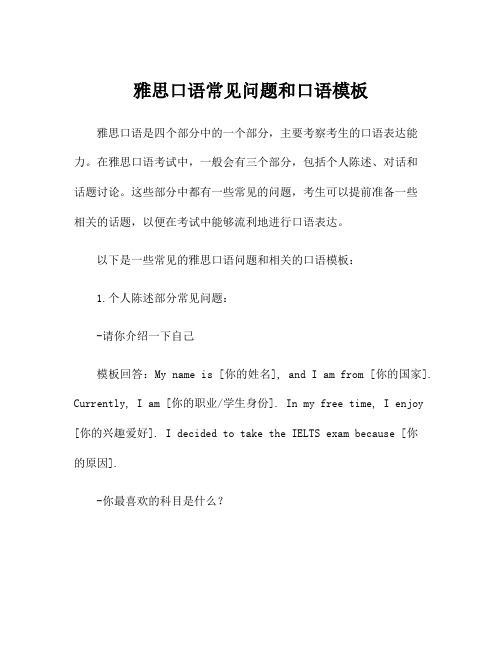
雅思口语常见问题和口语模板雅思口语是四个部分中的一个部分,主要考察考生的口语表达能力。
在雅思口语考试中,一般会有三个部分,包括个人陈述、对话和话题讨论。
这些部分中都有一些常见的问题,考生可以提前准备一些相关的话题,以便在考试中能够流利地进行口语表达。
以下是一些常见的雅思口语问题和相关的口语模板:1.个人陈述部分常见问题:-请你介绍一下自己模板回答:My name is [你的姓名], and I am from [你的国家]. Currently, I am [你的职业/学生身份]. In my free time, I enjoy [你的兴趣爱好]. I decided to take the IELTS exam because [你的原因].-你最喜欢的科目是什么?模板回答:My favorite subject is [科目名]. I find it fascinating because [原因]. I enjoy learning about [科目中的一个方面] because [原因]. It helps me to [你的学习目标].-你最喜欢的电视节目是什么?模板回答:My favorite TV show is [电视节目名]. I like it because [原因]. The characters are [形容词], and the storyline is [形容词]. It is entertaining and keeps me engaged.2.对话部分常见问题:-对话1:与考官的个人对话-请问你的名字是什么?模板回答:My name is [你的姓名].-你的家乡是哪里?模板回答:I am from [你的家乡]. It is located in [家乡所在地区/国家]. It is a [形容词] place with [一些描述特点].-你的家乡是一个怎样的地方?模板回答:My hometown is a [形容词] place. It is knownfor [一些特点]. The people are [形容词] and welcoming, andthe food is [形容词]. I love the atmosphere of my hometown.-对话2:与考官的对话-你认为追求成功重要吗?模板回答:I believe that pursuing success is important.It motivates us to work hard and achieve our goals. However,it is also important to define what success means to us individually.-你认为教育的重要性如何?模板回答:I believe that education is extremely important. It provides us with knowledge and skills that are essentialfor personal growth and development. It also opens up opportunities and improves our career prospects.3.话题讨论部分常见问题:-你认为旅行的好处是什么?模板回答:I believe that traveling has numerous benefits. Firstly, it allows us to experience different cultures and broadens our perspectives. Secondly, it helps us to relax and de-stress. Lastly, it provides us with valuable memories and experiences that we can cherish for a lifetime.-你认为宠物对人们的生活有什么影响?模板回答:I think pets have a positive impact on people's lives. They provide companionship and unconditional love. Additionally, taking care of a pet teaches responsibility and empathy. Pets can also help reduce stress and improve mental health.-你认为社交媒体对人们的生活有何影响?模板回答:I believe that social media has both positive and negative effects on people's lives. On one hand, it allows us to connect with others and share our thoughts andexperiences. It also provides a platform for learning and staying updated. On the other hand, excessive use of social media can be addictive and harmful to mental health.总结:在雅思口语考试中,准备一些常见问题的模板回答可以帮助考生更好地准备口语考试。
雅思口语考试常用短语和句子
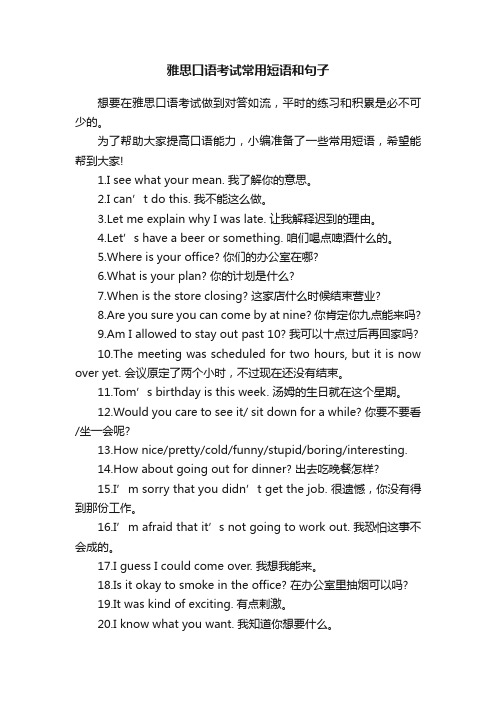
雅思口语考试常用短语和句子想要在雅思口语考试做到对答如流,平时的练习和积累是必不可少的。
为了帮助大家提高口语能力,小编准备了一些常用短语,希望能帮到大家!1.I see what your mean. 我了解你的意思。
2.I can’t do this. 我不能这么做。
3.Let me explain why I was late. 让我解释迟到的理由。
4.Let’s have a beer or something. 咱们喝点啤酒什么的。
5.Where is your office? 你们的办公室在哪?6.What is your plan? 你的计划是什么?7.When is the store closing? 这家店什么时候结束营业?8.Are you sure you can come by at nine? 你肯定你九点能来吗?9.Am I allowed to stay out past 10? 我可以十点过后再回家吗?10.The meeting was scheduled for two hours, but it is now over yet. 会议原定了两个小时,不过现在还没有结束。
11.Tom’s birthday is this week. 汤姆的生日就在这个星期。
12.Would you care to see it/ sit down for a while? 你要不要看/坐一会呢?13.How nice/pretty/cold/funny/stupid/boring/interesting.14.How about going out for dinner? 出去吃晚餐怎样?15.I’m sorry that you didn’t get the job. 很遗憾,你没有得到那份工作。
16.I’m afraid that it’s not going to work out. 我恐怕这事不会成的。
雅思口语之常考话题
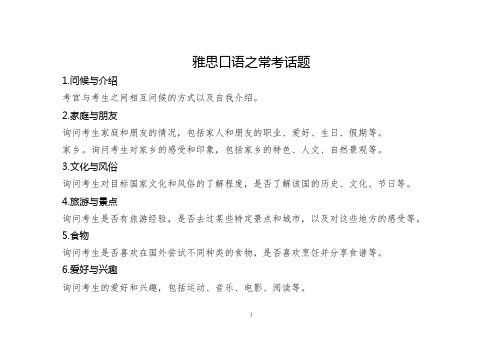
雅思口语之常考话题
1.问候与介绍
考官与考生之间相互问候的方式以及自我介绍。
2.家庭与朋友
询问考生家庭和朋友的情况,包括家人和朋友的职业、爱好、生日、假期等。
家乡。
询问考生对家乡的感受和印象,包括家乡的特色、人文、自然景观等。
3.文化与风俗
询问考生对目标国家文化和风俗的了解程度,是否了解该国的历史、文化、节日等。
4.旅游与景点
询问考生是否有旅游经验,是否去过某些特定景点和城市,以及对这些地方的感受等。
5.食物
询问考生是否喜欢在国外尝试不同种类的食物,是否喜欢烹饪并分享食谱等。
6.爱好与兴趣
询问考生的爱好和兴趣,包括运动、音乐、电影、阅读等。
1
7.语言技能
询问考生在语言技能方面的表现,包括英语水平、语法、词汇量等。
8.教育背景
询问考生的教育背景,包括所学专业、学校、成绩等。
9.工作与职业
询问考生的职业规划、工作经历等。
10.未来计划
询问考生在未来的打算,包括留学、旅游、移民等。
11.环保与可持续发展
询问考生对环保和可持续发展的看法,包括日常生活中如何实践可持续发展的措施等。
12.社会问题
询问考生对社会问题的看法,包括种族、性别、贫穷等问题。
2。
雅思口语常用的经典句型
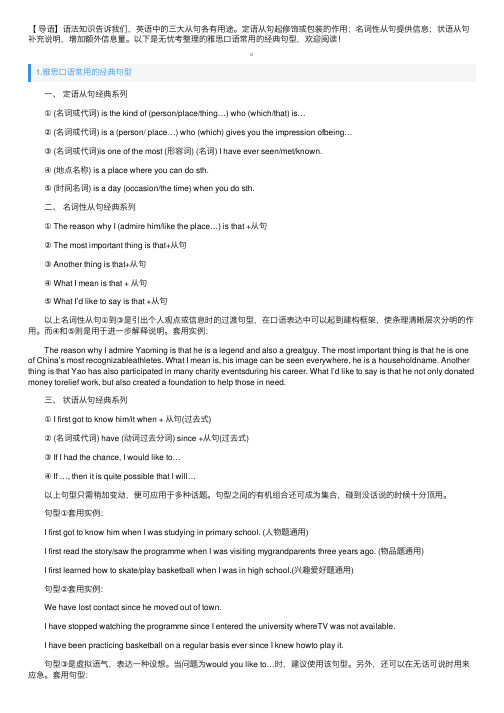
【导语】语法知识告诉我们,英语中的三⼤从句各有⽤途。
定语从句起修饰或包装的作⽤;名词性从句提供信息;状语从句补充说明,增加额外信息量。
以下是⽆忧考整理的雅思⼝语常⽤的经典句型,欢迎阅读!1.雅思⼝语常⽤的经典句型 ⼀、定语从句经典系列 ① (名词或代词) is the kind of (person/place/thing…) who (which/that) is… ② (名词或代词) is a (person/ place…) who (which) gives you the impression ofbeing… ③ (名词或代词)is one of the most (形容词) (名词) I have ever seen/met/known. ④ (地点名称) is a place where you can do sth. ⑤ (时间名词) is a day (occasion/the time) when you do sth. ⼆、名词性从句经典系列 ① The reason why I (admire him/like the place…) is that +从句 ② The most important thing is that+从句 ③ Another thing is that+从句 ④ What I mean is that + 从句 ⑤ What I’d like to say is that +从句 以上名词性从句①到③是引出个⼈观点或信息时的过渡句型,在⼝语表达中可以起到建构框架,使条理清晰层次分明的作⽤。
⽽④和⑤则是⽤于进⼀步解释说明。
套⽤实例: The reason why I admire Yaoming is that he is a legend and also a greatguy. The most important thing is that he is one of China’s most recognizableathletes. What I mean is, his image can be seen everywhere, he is a householdname. Another thing is that Yao has also participated in many charity eventsduring his career. What I’d like to say is that he not only donated money torelief work, but also created a foundation to help those in need. 三、状语从句经典系列 ① I first got to know him/it when + 从句(过去式) ② (名词或代词) have (动词过去分词) since +从句(过去式) ③ If I had the chance, I would like to… ④ If …, then it is quite possible that I will… 以上句型只需稍加变动,便可应⽤于多种话题。
雅思每口语必备句型
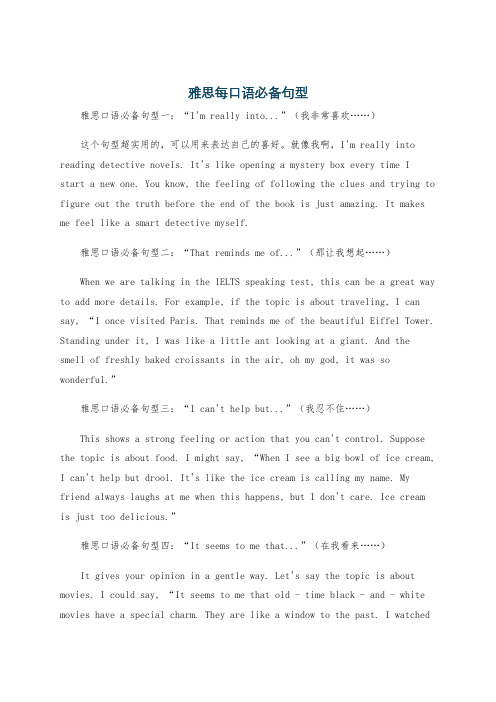
雅思每口语必备句型雅思口语必备句型一:“I'm really into...”(我非常喜欢……)这个句型超实用的,可以用来表达自己的喜好。
就像我啊,I'm really into reading detective novels. It's like opening a mystery box every time Istart a new one. You know, the feeling of following the clues and trying to figure out the truth before the end of the book is just amazing. It makes me feel like a smart detective myself.雅思口语必备句型二:“That reminds me of...”(那让我想起……)When we are talking in the IELTS speaking test, this can be a great way to add more details. For example, if the topic is about traveling, I can say, “I once visited Paris. That reminds me of the beautiful Eiffel Tower. Standing under it, I was like a little ant looking at a giant. And the smell of freshly baked croissants in the air, oh my god, it was so wonderful.”雅思口语必备句型三:“I can't help but...”(我忍不住……)This shows a strong feeling or action that you can't control. Suppose the topic is about food. I might say, “When I see a big bowl of ice cream, I can't help but drool. It's like the ice cream is calling my name. My friend always laughs at me when this happens, but I don't care. Ice creamis just too delicious.”雅思口语必备句型四:“It seems to me that...”(在我看来……)It gives your opinion in a gentle way. Let's say the topic is about movies. I could say, “It seems to me that old - time black - and - white movies have a special charm. They are like a window to the past. I watched'Casablanca' once, and I was completely drawn into the story. It made me think about how different love was back then.”雅思口语必备句型五:“You bet!”(当然啦!)This is a very positive and casual way to say yes. For instance, if the examiner asks me, “Do you like music?” I would answer, “You bet! I love all kinds of music. Rock music makes me feel energetic, like I can conquer the world. And classical music is like a gentle breeze on a hot day, calming me down.”雅思口语必备句型六:“What on earth...?”(究竟……?)We can use this to show surprise or confusion. If the topic is about strange customs. I might say, “What on earth is the custom of eating live insects in some cultures? It sounds so gross to me. My sister once told me about it, and I was like, 'Are you kidding me?' But then I realized different cultures have different things.”雅思口语必备句型七:“To be honest...”(老实说……)This helps to make your statement more sincere. Say the topic is about study. I'd say, “To be honest, I find math really difficult sometimes.It's like a big monster hiding in my textbook. I tried to ask my teacherfor help, and he was so nice. He explained things slowly, and I started to understand a bit better.”雅思口语必备句型八:“As far as I'm concerned...”(就我而言……)It's another way to give your personal view. For example, if we are talking about sports. I would say, “As far as I'm concerned, running is the best exercise. It doesn't need any special equipment. Just put on yourshoes and go. It's like a free therapy. Every time I run, I feel all my stress melting away.”雅思口语必备句型九:“I'm dying to...”(我渴望……)Shows a strong desire. If the topic is about future plans. I can say, “I'm dying to travel around the world. I've seen so many beautifulpictures and heard so many interesting stories. It's like there's a fire in my heart. I keep saving money so that I can make this dream come true.”雅思口语必备句型十:“How come...?”(怎么会……?)Used to ask about reasons in a very colloquial way. If the topic is about a strange event. I might say, “How come the dog can understand human language so well? I saw a video of a dog following its owner's commands perfectly. It's like the dog has a secret superpower or something.”In conclusion, these sentences can really help you in your IELTS speaking test. They can make your answers more vivid, natural and engaging.。
雅思口语常用120句型
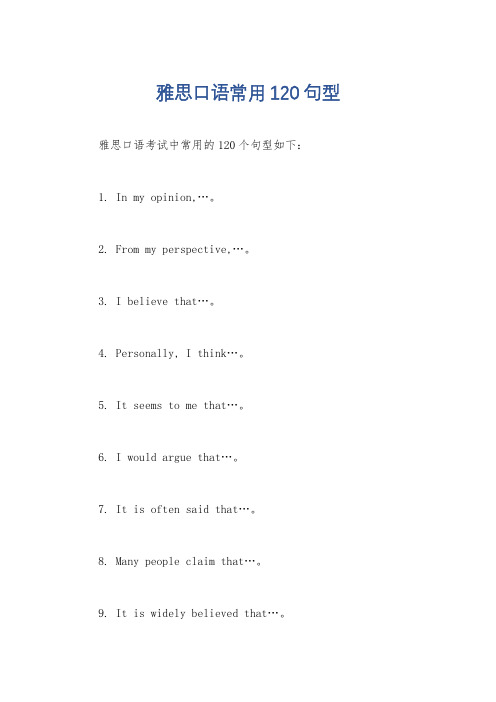
雅思口语常用120句型雅思口语考试中常用的120个句型如下:1. In my opinion,…。
2. From my perspective,…。
3. I believe that…。
4. Personally, I think…。
5. It seems to me that…。
6. I would argue that…。
7. It is often said that…。
8. Many people claim that…。
9. It is widely believed that…。
10. It is commonly thought that…。
11. According to research/statistics/studies…。
12. It is a well-known fact that…。
13. It goes without saying that…。
14. It is un deniable that…。
15. There is no doubt that…。
16. It is worth mentioning that…。
17. I must admit that…。
18. I couldn't agree more.19. I completely/totally agree.20. I strongly believe that…。
21. I have no doubt that…。
22. I am of the opinion that…。
23. I am convinced that…。
24. I am inclined to believe that…。
25. I am confident that…。
26. I am certain that…。
27. I am not sure, but…。
28. I am not convinced that…。
雅思口语考试的常见问答(精选)
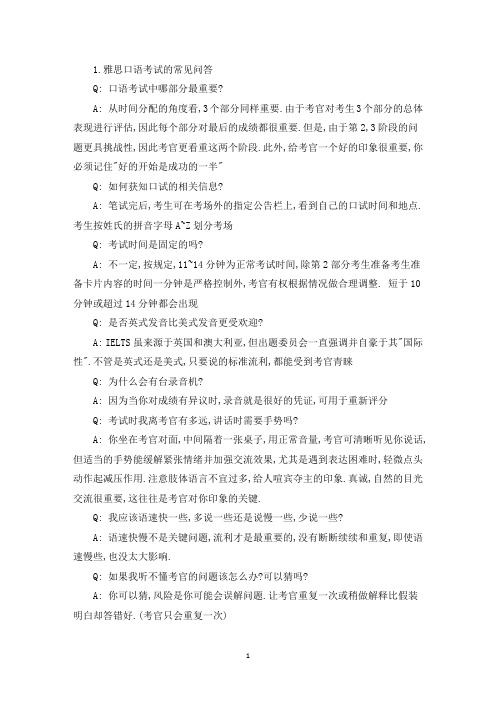
1.雅思口语考试的常见问答Q: 口语考试中哪部分最重要?A: 从时间分配的角度看,3个部分同样重要.由于考官对考生3个部分的总体表现进行评估,因此每个部分对最后的成绩都很重要.但是,由于第2,3阶段的问题更具挑战性,因此考官更看重这两个阶段.此外,给考官一个好的印象很重要,你必须记住"好的开始是成功的一半"Q: 如何获知口试的相关信息?A: 笔试完后,考生可在考场外的指定公告栏上,看到自己的口试时间和地点.考生按姓氏的拼音字母A~Z划分考场Q: 考试时间是固定的吗?A: 不一定,按规定,11~14分钟为正常考试时间,除第2部分考生准备考生准备卡片内容的时间一分钟是严格控制外,考官有权根据情况做合理调整. 短于10分钟或超过14分钟都会出现Q: 是否英式发音比美式发音更受欢迎?A: IELTS虽来源于英国和澳大利亚,但出题委员会一直强调并自豪于其"国际性".不管是英式还是美式,只要说的标准流利,都能受到考官青睐Q: 为什么会有台录音机?A: 因为当你对成绩有异议时,录音就是很好的凭证,可用于重新评分Q: 考试时我离考官有多远,讲话时需要手势吗?A: 你坐在考官对面,中间隔着一张桌子,用正常音量,考官可清晰听见你说话,但适当的手势能缓解紧张情绪并加强交流效果,尤其是遇到表达困难时,轻微点头动作起减压作用.注意肢体语言不宜过多,给人喧宾夺主的印象.真诚,自然的目光交流很重要,这往往是考官对你印象的关键.Q: 我应该语速快一些,多说一些还是说慢一些,少说一些?A: 语速快慢不是关键问题,流利才是最重要的,没有断断续续和重复,即使语速慢些,也没太大影响.Q: 如果我听不懂考官的问题该怎么办?可以猜吗?A: 你可以猜,风险是你可能会误解问题.让考官重复一次或稍做解释比假装明白却答错好.(考官只会重复一次)2.雅思口语考试指南雅思口语考试评分是由考生的考试全程的表现获得的。
雅思口语考试面试170问
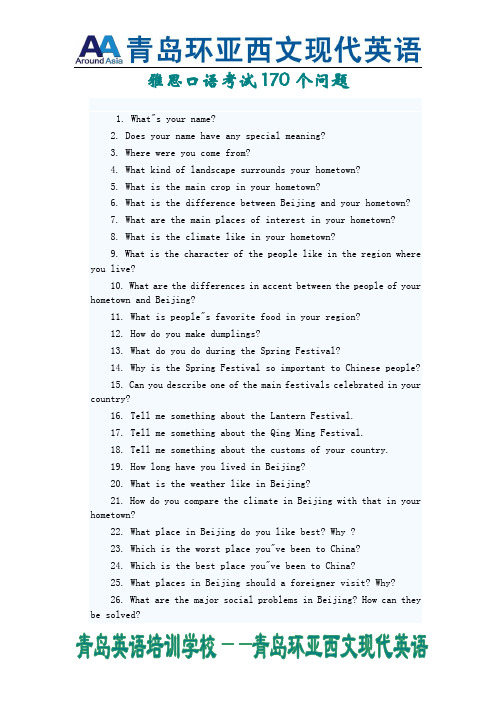
雅思口语考试170个问题1. What"s your name?2. Does your name have any special meaning?3. Where were you come from?4. What kind of landscape surrounds your hometown?5. What is the main crop in your hometown?6. What is the difference between Beijing and your hometown?7. What are the main places of interest in your hometown?8. What is the climate like in your hometown?9. What is the character of the people like in the region where you live?10. What are the differences in accent between the people of your hometown and Beijing?11. What is people"s favorite food in your region?12. How do you make dumplings?13. What do you do during the Spring Festival?14. Why is the Spring Festival so important to Chinese people?15. Can you describe one of the main festivals celebrated in your country?16. Tell me something about the Lantern Festival.17. Tell me something about the Qing Ming Festival.18. Tell me something about the customs of your country.19. How long have you lived in Beijing?20. What is the weather like in Beijing?21. How do you compare the climate in Beijing with that in your hometown?22. What place in Beijing do you like best? Why ?23. Which is the worst place you"ve been to China?24. Which is the best place you"ve been to China?25. What places in Beijing should a foreigner visit? Why?26. What are the major social problems in Beijing? How can they be solved?27. What is the biggest problem China faces?28. What places in Beijing should a foreigner visit? Why?29. Could you tell me something about your family?30. Have you any children?31. What is your child"s name? Does his name have a meaning?32. What does your wife/husband do?33. When did you get married?34. Describe your wedding.35. How have weddings changed in recent years?36. Are there any special customs about wedding in your region?37. Describe a traditional wedding ceremony.38. Where did you go for your honeymoon?39. Did you have to ask for permission from your parents before you got married?40. Is it acceptable for couples to live together without marrying?41. Where do you think a newly couple should live? Living with their parents or on their own?42. What responsibilities should a couple take?43. How do Chinese usually celebrate birthdays?44. Are there any traditions concerning the birth of a baby?45. What kind of parent do you intend to be?46. What do you think of One-Child Policy in China?47. Why do people in China traditionally want to have a son?48. What difficulties do Chinese farmers have concerning their old age?49. What do you think needs to be done in order to relieve the farmer"s worries?50. What hope or fears do you have for your children?51. What sort of culture do you hope your child will grow up in?52. Are you going to bring up your child differently from the way you were brought up? How?53. Do you enjoy shopping?54. Who does most of the shopping in your family?55. What are you good at cooking? What is your favorite dish?80. If you had the opportunity to change your job, what would you do with it?81. Do you have any ambitious?82. Will any possible future changes affect your job in any way?83. What are your spare time interests?84. How do you spend your weekends?85. What is your favorite sport? What are the rules?86. What is the most popular sport in your country?87. What are the sporting facilities like in youruniversity/Beijing?88. What do you know about Qigong? Do you believe in Qigong?89. What do you do in your spare time?90. Do you often read newspapers? If not, why ones do you read?91. What do you think of computer?92. Do you think computer has changed our life so much?93. Do you often go to the cinema/theatre?94. What kind of films do you like best?95. Do you often watch TV? What is your favorite program?96. Do you think watching TV too much is a waste of time?97. What kind of music do you enjoy?98. Who is your favorite film star? Will you describe him/her to me?99. Do you enjoy travelling?100. Where have you been travelling to? Which place interested you most?101. Do you smoking?102. Do you think smoking is a problem that needs special attention and has to be solved? If so, why?103. What do you know about ABC?104. What problem do you think you will have in ABC?105. How will you overcome the difficulties?106. Do you think you will be able to cope with English-demands of your intended study program in ABC?107. What difficulties do you think you’ll encounter in your studies in ABC?108. Can you imagine what life in Britain/Canada/Australia/London, etc. would be like?109. How will you fare in Britain/Canada/Australia, etc. without your family?110. What do you intend to study?111. Which university are you going to study at?112. Why did you choose this university?113. Where are you going to study in ABC?114. What are you plans in ABC?115. What is your research proposal all about?116. What do you hope for most from your study abroad?117. Will your study abroad help your job prospects after come back to China?118. Should you study more theory or do more practice? Give your reasons, please.119. What kind of differences in the cultures are you expecting between China and the ABC?120. How will your study in Britain benefit your work in China when you come back to China?121. What do you intend to do after you finish studying?122. What will be your main problem when you are study in a foreign country?123. What problem can you foresee in the future when you come back to China?124. Will there be any adjustment problems in your life when you come back to China? If so, what are they?125. Will you have to make any changes in your work/life when you come back to China?126. Do you think there will be a gap between your knowledge gained in China and the level of knowledge you are going to encounter on arrival? If so, what will it be?127. What do you think of the future of China keeps an open policy?128. What do you regard as the most significant events in your country’s recent history?129. Are there any special places you want to see in Canada? What are they?130. What do you especially want to do in Canada?131. How do you like your life in ABC University?132. What do you think of the training in the university?133. In what way do you think university training is helpful or falls short?134. What aspect of English do you find the most difficult?135. Do you find American English easier to understand than Britain English?136. What sports are played in your country?137. Could you describe the traditional architecture of your country?138. What role dose religion play in everyday life in your country?139. What would you regard as the most significant events in your country"s recent history?140. How aware do you think people are nowadays about environmental issues?141. Could you tell me why you chose to study at the university of ABC?142. What role dose tourism play in your country"s economy?143. How serious is unemployment in your country?144. In your opinion, what are the most serious problems associated with modern life?145. What do you think have been the most important changes in your field over the past 5 years?146. What are you going to major in ?147. Are you going to do your own cooking when you are at university?148. Some local students feel that overseas students get preferential treatment. What is your opinion?149. Do you think you will be able to cope with the English-language demands of your intended program?150. What do you think are the main causes of road accidents?151. Do you think the government is doing enough to prevent road accidents?152. As there are more and more private cars, what do you think the government should do in order to encourage citizens to use public transport?153. How do you see yourself in ten years" time?154. Have you ever thought to have your own business?155. What business do you hope to have?156. Do you know about any policies about opening a business abroad?157. What are your plans for your future?158. Why do you think there are more and more people leaving to immigrate to other countries?159. Is it good for China that so many people are going to other countries?160. Will your life change a lot after you immigrate to ABC?161. What will you do if you are ill abroad?162. Do you know what to do in case of emergency?163. What will do if you cannot find a job in ABC?164. Why do you want to immigrate to ABC?165. What will you do after the IELTS test?166. What will do if you fail the IELTS test?167. What"s your dream job?168. How long have you been learning English?169. What troubles you most at the moment?170. Does your family support your decision on going ABC? What help do they offer?。
雅思口语考试常见话题及回答

雅思口语考试常见话题及回答雅思口语考试常见话题及回答如下:1.What’s your name?My name is Lily, but my friends usually call me Lee. It’s a lot easier and more casual! I love how names can reflect personality.2.Where are you from?I’m from Shanghai, a city known for its vibrant culture and amazing food. I love the energy of the city! It feels like there’s always something new to discover.3.Do you work or study?I’m currently studying psychology at university. I find human behavior fascinating and want to help people. It's a field that really makesa difference in people's lives.4.Why did you choose that subject?I chose psychology because I want to understand how people think and feel. It’s rewarding to help others improve their mental health. I believe mental well-being is crucial for a fulfilling life.5.What do you like to do in your free time?In my free time, I love painting. It’s a great way to relax and express my creativity. Sometimes, I even take my sketchbook to the park for inspiration!6.Do you enjoy reading?Absolutely! I enjoy mystery novels; they really keep me on the edge of my seat. There’s something thrilling about trying to solve the puzzle before the end.7.How often do you exercise?I try to exercise about four times a week. Whether it’s jogging or yoga, it really helps me feel good. It’s a great way to boost my mood and energy levels.8.What kind of music do you like?I love pop music, especially artists like Taylor Swift. Her songs are so catchy and relatable! Music is my go-to for lifting my spirits during tough days.9.Have you ever traveled abroad?Yes, I went to Japan last year. The food and culture were incredible, and I had such a great time exploring! I can’t wait to visit more countries in the future.10.What’s your favorite holiday?My favorite holiday is Chinese New Year. It’s all about family, delicious food, and beautiful decorations! The traditions really bring everyone closer together.11.How do you usually celebrate your birthday?I usually have a small party with close friends and family. We eat cake and play games; it’s always fun! I love making memories on my special day.12.What’s your favorite food?I absolutely love sushi! It’s fresh and delicious, and I can eat it every day. Each piece feels like a little work of art.113.Do you cook often?I cook a few times a week, trying out new recip es. It’s satisfying to create something tasty! Plus, it’s healthier than ordering takeout all the time.14.What’s your favorite movie?My favorite movie is “Inception.” I love how it makes you think and challenges your perception of reality. Every time I watch it, I discover something new.15.Do you prefer watching movies at home or in the cinema?I prefer watching movies at home. It’s cozy, and I can snack whenever I want! Plus, I can pause if Ineed a break.16.What’s a recent movie you watched?I recently watched “The Secret Garden.” It was beautifully made, and I loved the message of hope. The visuals were stunning and really transported me.17.Do you like to go shopping?I enjoy shopping, especially for clothes. It’s fun to find new outfits that make me feel good. I love experimenting with different styles!18.How often do you use the internet?I’m on the internet every day, mainly for studying and connecting with friends. It’s a big part of my life. It’s amazing how connected we can be nowadays.19.What do you do to relax?I like listening to music to unwind. It really helps me forget about my worries for a while. Sometimes, I also meditate to clear my mind.20.Do you have any pets?Yes, I have a cat named Whiskers. He’s so playful and always makes me laugh! He definitely brings a lot of joy into my life.21.What’s your dream job?My dream job is to be a clinical psychologist. I want to help people navigate their mental health challenges. It’s important work that I feel passionate about.22.How do you stay motivated?I stay motivated by setting small, achievable goals. It’s satisfying to see my progress! Celebrating those small wins keeps me inspired.23.Do you enjoy socializing?Yes, I love spending time with friends. It’s always nice to catch up and have fun together. Good company makes everything better!24.What’s your favorite season?I love spring because everything blooms, and theweather is perfect for outdoor activities. It feels like a fresh start after winter! 25.How do you usually spend your weekends?I spend my weekends hanging out with frien ds or catching up on my favorite shows. It’s a great way to relax and recharge for the week ahead.26.What’s a hobby you’d like to try?I’d love to try photography. Capturing beautiful moments sounds exciting and creative! It would be great to share my perspective through images.27.Do you play any sports?I play badminton occasionally. It’s a fun way to stay active and socialize. Plus, it’s always exciting to compete with friends!28.How important is it to have friends?Having friends is really important to me. They provide support and make life more enjoyable! Good friends are like family you choose for yourself.29.What’s your favorite place in your city?My favorite place in Shanghai is the Bund. The view of the skyline at night is just breathtaking! I could sit there for hours just soaking it all in.30.How often do you spend time with your family?I try to spend time with my family every weekend. It’s nice to bond over meals and catch up. Family time is something I cherish deeply.。
15个最常见的雅思口语话题及答案 Part 1
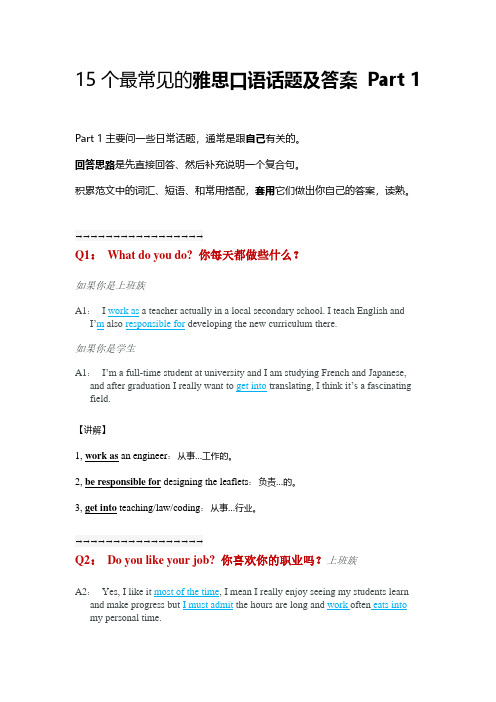
15个最常见的雅思口语话题及答案Part 1Part 1主要问一些日常话题,通常是跟自己有关的。
回答思路是先直接回答、然后补充说明一个复合句。
积累范文中的词汇、短语、和常用搭配,套用它们做出你自己的答案,读熟。
→→→→→→→→→→→→→→→→→Q1:What do you do? 你每天都做些什么?如果你是上班族A1:I work as a teacher actually in a local secondary school. I teach English and I’m also responsible for developing the new curriculum there.如果你是学生A1:I’m a full-time student at university and I am studying French and Japanese, and after graduation I really want to get into translating, I think it’s a fascinating field.【讲解】1, work as an engineer:从事…工作的。
2, be responsible for designing the leaflets:负责…的。
3, get into teaching/law/coding:从事…行业。
→→→→→→→→→→→→→→→→→Q2:Do you like your job? 你喜欢你的职业吗?上班族A2:Yes, I like it most of the time, I mean I really enjoy seeing my students learn and make progress but I must admit the hours are long and work often eats into my personal time.【讲解】1, most of the time后面通常是要表达相反的意见。
英文雅思聊天话题

英文雅思聊天话题1. What's your name? 你叫什么名字?2. Where are you from? 你来自哪里?3. What do you do for a living? 你是做什么工作的?4. What are your hobbies? 你的爱好是什么?5. Do you have any siblings? 你有兄弟姐妹吗?6. What's your favorite color? 你最喜欢的颜色是什么?7. What's your favorite food? 你最喜欢的食物是什么?8. What's your favorite movie? 你最喜欢的电影是什么?9. Do you like reading? 你喜欢阅读吗?10. What's your favorite book? 你最喜欢的书是什么?11. Do you like traveling? 你喜欢旅行吗?12. Where have you been to? 你去过哪里?13. What's your favorite place? 你最喜欢的地方是什么?14. Do you have a pet? 你有宠物吗?15. What's your favorite animal? 你最喜欢的动物是什么?16. Do you like sports? 你喜欢运动吗?17. What's your favorite sport? 你最喜欢的运动是什么?18. Do you play any musical instruments? 你会演奏乐器吗?19. What's your favorite music genre? 你最喜欢的音乐类型是什么?20. Do you like singing? 你喜欢唱歌吗?21. What's your favorite song? 你最喜欢的歌曲是什么?22. Do you watch TV? 你看电视吗?23. What's your favorite TV show? 你最喜欢的电视节目是什么?24. Do you have a dream? 你有梦想吗?25. What's your goal in life? 你的人生目标是什么?26. Do you believe in destiny? 你相信命运吗?27. What's the most important thing in life? 生命中最重要的事情是什么?28. Do you have a girlfriend/boyfriend? 你有女朋友/男朋友吗?29. How did you meet your significant other? 你是怎么认识你的另一半的?30. What's the best thing about being in a relationship? 恋爱中最好的事情是什么?31. Do you have any children? 你有孩子吗?32. What's the best thing about being a parent? 做父母最好的事情是什么?33. Do you like shopping? 你喜欢购物吗?34. What's your favorite store? 你最喜欢的商店是什么?35. Do you like fashion? 你喜欢时尚吗?36. What's your style? 你的风格是什么?37. Do you like cooking? 你喜欢烹饪吗?38. What's your favorite dish? 你最喜欢的菜肴是什么?39. Do you like trying new foods? 你喜欢尝试新食物吗?40. What's the best food you've ever had? 你吃过的最好吃的食物是什么?41. Do you like nature? 你喜欢大自然吗?42. What's your favorite season? 你最喜欢的季节是什么?43. Do you like going on picnics? 你喜欢去野餐吗?44. What's the most beautiful place you've ever been to? 你去过的最美丽的地方是什么?45. Do you like art? 你喜欢艺术吗?46. What's your favorite artist? 你最喜欢的艺术家是谁?47. Have you ever visited a museum? 你曾经参观过博物馆吗?48. What's the most interesting exhibition you've ever seen? 你看过的最有趣的展览是什么?49. Do you like watching movies? 你喜欢看电影吗?50. What's your favorite movie genre? 你最喜欢的电影类型是什么?51. What's the best movie you've ever seen? 你看过的最好的电影是什么?52. Do you like going to the theater? 你喜欢去剧院吗?53. What's your favorite play? 你最喜欢的戏剧是什么?54. Have you ever been to a concert? 你曾经去过音乐会吗?55. What's your favorite band? 你最喜欢的乐队是什么?56. Do you like photography? 你喜欢摄影吗?57. What's your favorite photo you've taken? 你拍摄的最喜欢的照片是什么?58. Do you like technology? 你喜欢科技吗?59. What's the latest gadget you've bought? 你最近买的最新小玩意儿是什么?60. Do you like spending time on social media? 你喜欢在社交媒体上花费时间吗?61. What's your favorite social media platform? 你最喜欢的社交媒体平台是什么?62. Do you like playing video games? 你喜欢玩视频游戏吗?63. What's your favorite video game? 你最喜欢的视频游戏是什么?64. Do you like sports? 你喜欢运动吗?65. What's your favorite sport? 你最喜欢的运动是什么?66. Have you ever participated in a sports competition? 你曾经参加过体育比赛吗?67. Do you like reading? 你喜欢阅读吗?68. What's your favorite book? 你最喜欢的书是什么?69. Have you ever written a book? 你曾经写过书吗?70. Do you like traveling? 你喜欢旅行吗?71. Where's the best place you've ever traveled to? 你曾经旅行过的最好的地方是哪里?72. Do you have any plans for future travels? 你有未来旅行的计划吗?73. Do you like learning new languages? 你喜欢学习新语言吗?74. What's the hardest language you've ever learned? 你曾经学过的最难的语言是什么?75. Do you have any tips for learning a new language? 你有学习新语言的技巧吗?76. Do you like animals? 你喜欢动物吗?77. What's your favorite animal? 你最喜欢的动物是什么?78. Have you ever owned a pet? 你曾经拥有过宠物吗?79. Do you like volunteering? 你喜欢做志愿者吗?80. What's the most meaningful volunteer work you've done? 你做过的最有意义的志愿者工作是什么?81. Do you have any plans for future volunteer work? 你有未来志愿者工作的计划吗?82. Do you like music? 你喜欢音乐吗?83. What's your favorite genre of music? 你最喜欢的音乐类型是什么?84. Do you play any instruments? 你会演奏任何乐器吗?85. Have you ever been to a music festival? 你曾经去过音乐节吗?86. Do you like watching TV shows? 你喜欢看电视节目吗?87. What's your favorite TV show? 你最喜欢的电视节目是什么?88. Do you like watching documentaries? 你喜欢看纪录片吗?89. Have you ever binge-watched a TV show? 你曾经一口气看完一部电视剧吗?90. Do you like fashion? 你喜欢时尚吗?91. What's your favorite fashion trend? 你最喜欢的时尚潮流是什么?92. Do you follow any fashion bloggers or influencers? 你关注任何时尚博主或影响者吗?93. Have you ever participated in a fashion show? 你曾经参加过时装秀吗?94. Do you like cooking? 你喜欢烹饪吗?95. What's your favorite dish to cook? 你最喜欢做的菜是什么?96. Do you have any cooking tips or tricks? 你有任何烹饪技巧或窍门吗?97. Have you ever tried any exotic foods? 你曾经尝试过任何异国风味的食物吗?98. Do you like working out? 你喜欢锻炼吗?99. What's your favorite form of exercise? 你最喜欢的锻炼方式是什么?100. Do you have a fitness routine? 你有健身计划吗?。
常用雅思口语对话讲解
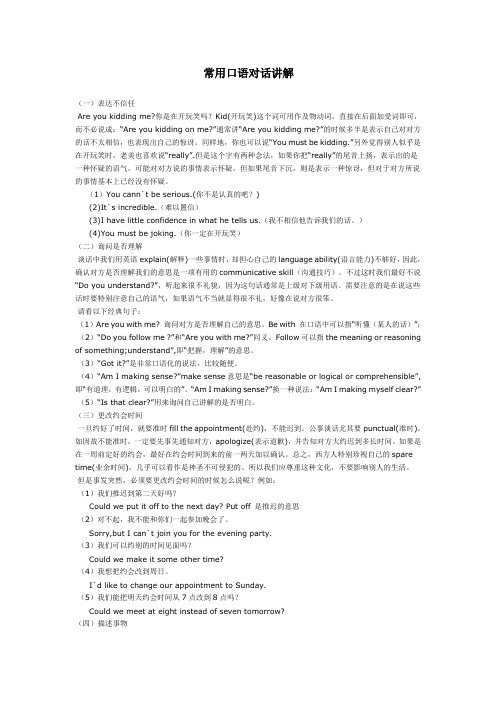
常用口语对话讲解(一)表达不信任Are you kidding me?你是在开玩笑吗?Kid(开玩笑)这个词可用作及物动词,直接在后面加受词即可,而不必说成:“Are you kidding on me?”通常讲“Are you kidding me?”的时候多半是表示自己对对方的话不太相信,也表现出自己的惊讶。
同样地,你也可以说“You must be kidding.”另外觉得别人似乎是在开玩笑时,老美也喜欢说“really”.但是这个字有两种念法,如果你把“really”的尾音上扬,表示出的是一种怀疑的语气,可能对对方说的事情表示怀疑,但如果尾音下沉,则是表示一种惊讶,但对于对方所说的事情基本上已经没有怀疑。
(1)You cann`t be serious.(你不是认真的吧?)(2)It`s incredible.(难以置信)(3)I have little confidence in what he tells us.(我不相信他告诉我们的话。
)(4)You must be joking.(你一定在开玩笑)(二)询问是否理解谈话中我们用英语explain(解释)一些事情时,却担心自己的language ability(语言能力)不够好,因此,确认对方是否理解我们的意思是一项有用的communicative skill(沟通技巧)。
不过这时我们最好不说“Do you understand?”,听起来很不礼貌,因为这句话通常是上级对下级用语。
需要注意的是在说这些话时要特别注意自己的语气,如果语气不当就显得很不礼,好像在说对方很笨。
请看以下经典句子:(1)Are you with me? 询问对方是否理解自己的意思。
Be with 在口语中可以指“听懂(某人的话)”;(2)“Do you follow me ?”和“Are you with me?”同义。
Follow可以指the meaning or reasoning of something;understand”,即“把握,理解”的意思。
雅思口语之对话句式

雅思口语之对话句式
1.对话开始
Hello, how are you? 你好吗?
Nice to meet you. 很高兴见到你。
2.介绍自己
My name is XX. 我叫XX。
I'm a student at XX University. 我XX大学的学生。
3.询问信息
What's your major? 你是什么专业的?
How long have you been studying English? 你学英语多久了?
4.表达观点
I think that XX is very important. 我认为XX非常重要。
1
In my opinion, XX is a better choice. 在我看来,XX是一个更好的选择。
5.提出建议
You should try to speak more English every day. 你应该试着每天多说英语。
It's a good idea to study in a group. 在小组里学习是个好主意。
6.表达感谢
Thank you very much for your help.非常感谢你的帮助。
I appreciate your time and effort. 我感激你的时间和努力。
7.结束对话
It was nice talking to you. 很高兴和你交谈。
Hope to see you again in the future. 希望未来能再次见到你。
2。
雅思口语考试题型

雅思口语考试题型常见的雅思口试题型有以下这些。
Part 1:最常见的雅思口语题型多对一谈话 One-on-one interview)问题类型:考官就一个主题与考生进行一对一的谈话,谈话时间一般为2-3分钟。
示例句型:考官:Do you enjoy English classes?你:Yes, I do.考官:Why do you enjoy English classes?你:Because English classes help me improve my listening and speaking skills.Part 2:最常见的雅思口语题型两人小组讨论 Two-person group discussion)问题类型:考官将考生分成两人小组,并就一个主题展开讨论,讨论时间一般为2-3分钟。
示例句型:考官:What are the advantages and disadvantages of globalization?你:The advantages of globalization are that it can bring more trade opportunities and economic development for all. But it also has some disadvantages, such as environmental pollution and cultural differences.Part 3:独立口语 Independent Speaking)问题类型:考官给考生一个话题,考生根据自己的兴趣、经历或观点进行2分钟左右的个人演讲,之后考官对考生的演讲进行提问或与考生进行互动。
示例句型:考官:What are the differences between personal hobbies and professional careers?你:Personal hobbies can help me relax and de-stress. But professional careers require me to have a strong focus and work ethic.Part 4:配对口语 Paired Interview)问题类型:考官将考生分成两人一组,并提供一个话题,两人根据这个话题进行配对讨论,讨论时间一般为2-3分钟。
雅思英语口语对话范例集锦

雅思英语口语对话范例集锦雅思口语有一部分是和考官对话的,下面小编给大家整理了一些雅思英语口语对话范例,希望可以帮助到大家备考。
2017年雅思口语对话示范一、口语考试套话倒背如流1. 与考官见面用语Glad to meet you here.How nice to see you.Fancy seeing you.How are you?I’m glad to have had the opportunity to meet you here.I’m glad to meet you.I’m please to meet you.It’s a pleasure to meet you.2. 对考官所提问题完全听不懂Could you please rephrase that question / topic?I’m not exactly sure what you mean…3. 对考官所提问题似懂非懂要核实对考官所提问题的理解是否正确Do you mean…?If I understand right,…I’m sorry if I’m being a little slow, but…?I’m sorry, I’m not sure I understand. Do you mean (that)…?So am I right in saying…?If I’ve got the picture, then…So what you mean is…, right?Sorry I don’t quite catch you. You mean…?Can I get one thing clear?Would I be correct in supposing…?4. 对考官所提问题的内容不熟悉I’m not exactly sure how to answer that question, but (perhaps)…That’s a rather difficult question, but (maybe)…I’m sorry, but I don’t know much about…5. 评价考官所提问题That’s difficult to answer, but (maybe)…I’m sorry, but I don’t know much about…but perhaps…Maybe I can answer your question by telling you about a personal experience I had.That’s an interesting question…let me see. Well, I suppose th at…Yes, that’s a big issue.6. 连接词Well,…Actually,…In fact,…You see,…You know,…How shall I put it,…Let me think for a second,…Give me a few seconds,…7. 换一种方式重述In other words, I am…And that means…Let me put it another way,…What I’m suggesting is…All I’m trying to say is…What I’m getting at is…If I can rephrase that,…Perhaps I should make that clearer by saying…Perhaps it would be more accurate to say…The point I’m making is that…8. 回答完毕,询问考官是否还需补充其它信息Have I given you enough information?Would you like me to tell you more about…?Is that all you’d like to know?9. 回答完毕,考生认为已经无话可说了I’m afraid that’s about as much as I know.I think that’s all.I can’t think of anything else right now…Is there anything else you wish to know?10. 最后结束语表达Th at’s very kind of you. Thank you.Thank you very much for giving me information.Well, thanks for talking to me and I wish you all the best in your future.Thank you, sir.Nice talking to you.Before you go, is there anything else you'd like to tell me?I appreciate your talking with me. Goodbye.I enjoyed talking to you.It has been very helpful talking to you.Hope to see you again.雅思对话口语:MagazineDescribe an interesting magazine.You should say:what the magazine specializes in①what information it cont ains②who you think reads this magazine③and explain why you think this magazine is interesting④-----------------------------------------------------------------------------------------解答思路:将①②③作为④的原因,把整个话题卡串联起来,使其make sense. 最后总结,可以谈一下读杂志为自己带来什么好处,如何使自己受益。
- 1、下载文档前请自行甄别文档内容的完整性,平台不提供额外的编辑、内容补充、找答案等附加服务。
- 2、"仅部分预览"的文档,不可在线预览部分如存在完整性等问题,可反馈申请退款(可完整预览的文档不适用该条件!)。
- 3、如文档侵犯您的权益,请联系客服反馈,我们会尽快为您处理(人工客服工作时间:9:00-18:30)。
口语常见170问和常用72句型雅思口语考试考官最爱问的170个经典问题IELTS口语考试常见问题1. What’s your name?2. Does your name have any special meaning?3. Where were you come from?4. What kind of landscape surrounds your hometown?5. What is the main crop in your hometown?6. What is the difference between Beijing and your hometown?7. What are the main places of interest in your hometown?8. What is the climate like in your hometown?9. What is the character of the people like in the region where you live?10. What are the differences in accent between the people of your hometown and Beijing?11. What is people’s favorite food in your region?12. How do you make dumplings?13. What do you do during the Spring Festival?14. Why is the Spring Festival so important to Chinese people?15. Can you describe one of the main festivals celebrated in your country?16. Tell me something about the Lantern Festival.17. Tell me something about the Qing Ming Festival.18. Tell me something about the customs of your country.19. How long have you lived in Beijing?20. What is the weather like in Beijing?21. How do you compare the climate in Beijing with that in your hometown?22. What place in Beijing do you like best? Why?23. Which is the worst place you’ve been to China?24. Which is the best place yo u’ve been to China?25. What places in Beijing should a foreigner visit? Why?26. What are the major social problems in Beijing? How can they be solved?27. What is the biggest problem China faces?28. What places in Beijing should a foreigner visit? Why?29. Could you tell me something about your family?30. Have you any children?31. What is your child’s name? Does his name have a meaning?32. What does your wife/husband do?33. When did you get married?34. Describe your wedding.35. How have weddings changed in recent years?36. Are there any special customs about wedding in your region?37. Describe a traditional wedding ceremony.38. Where did you go for your honeymoon?39. Did you have to ask for permission from your parents before you got married?40. Is it acceptable for couples to live together without marrying?41. Where do you think a newly couple should live? Living with their parents or on their own?42. What responsibilities should a couple take?43. How do Chinese usually celebrate birthdays?44. Are there any traditions concerning the birth of a baby?45. What kind of parent do you intend to be?46. What do you think of One-Child Policy in China?47. Why do people in China traditionally want to have a son?48. What difficulties do Chinese farmers have concerning their old age?49. What do you think needs to be done in order to relieve the farmer’s worries?50. What hope or fears do you have for your children?51. What sort of culture do you hope your child will grow up in?52. Are you going to bring up your child differently from the way you were brought up? How?53. Do you enjoy shopping?54. Who does most of the shopping in your family?55. What are you good at cooking? What is your favorite dish?56. Who does most of cooking in your family?57. Is there sex discrimination in China?58. How do you sum up women’s conditions in China?59. What are the causes of sex discrimination?60. Should government pay certain salaries to those housewives? Why or why not?61. Would you want your wife to continue with her career or to stay at home taking care of thehousehold after you get married?62. Have you ever wished to be one of the opposite sexes? Why (why not)?63. What would you do if your next-door neighbor were noisy nearly all the time?64. Do you have a lot of friend?65. What does friendship mean to you? What kind of people do you make friend with?66. What is your major?67. How do you like your major?68. When and where did you graduate? What qualifications have you obtained?69. Do you still remember your school days?70. What impressed you most when you were at university?71. Which is the best university in your country?72. Could you sum up your own study habits in a few points?73. What do you think of the practice of setting up key schools in primary and secondaryschool education in China?74. Do you think the subjects you are studying today are relevant to present-day society?Why?75. What do you think education should be? Should it be a process of learning what is usefulfor your future life or should it be simply learning for enjoyment? Why?76. What do you do for a living?77. What do you do in the office every day?78. Since your job seems too professional to me, could you explain it in detail?79. What are your job prospects?80. If you had the opportunity to change your job, what would you do with it?81. Do you have any ambitious?82. Will any possible future changes affect your job in any way?83. What are your spare time interests?84. How do you spend your weekends?85. What is your favorite sport? What are the rules?86. What is the most popular sport in your country?87. What are the sporting facilities like in your university/Beijing?88. What do you know about Qigong? Do you believe in Qigong?89. What do you do in your spare time?90. Do you often read newspapers? If not, why ones do you read?91. What do you think of computer?92. Do you think computer has changed our life so much?93. Do you often go to the cinema/theatre?94. What kind of films do you like best?95. Do you often watch TV? What is your favorite program?96. Do you think watching TV too much is a waste of time?97. What kind of music do you enjoy?98. Who is your favorite film star? Will you describe him/her to me?99. Do you enjoy traveling?100. Where have you been traveling to? Which place interested you most? 101. Do you smoking?102. Do you think smoking is a problem that needs special attention and has to be solved? Ifso, why?103. What do you know about XXX?104. What problem do you think you will have in XXX?105. How will you overcome the difficulties?106. Do you think you will be able to cope with English-demands of your intended studyprogram in XXX?107. What difficulties do you think you’ll encounter in your studies in XXX? 108. Can you imagine what life in Britain/Canada/Australia/London, etc. would be like?109. How will you fare in Britain/Canada/Australia, etc. without your family? 110. What do you intend to study?111. Which university are you going to study at?112. Why did you choose this university?113. Where are you going to study in XXX?114. What are you plans in XXX?115. What is your research proposal all about?116. What do you hope for most from your study abroad?117. Will your study abroad help your job prospects after come back to China? 118. Should you study more theory or do more practice? Give your reasons, please.119. What kind of differences in the cultures are you expecting between China and the XXX?120. How will your study in Britain benefit your work in China when you come back to China?121. What do you intend to do after you finish studying?122. What will be your main problem when you are study in a foreign country? 123. What problem can you foresee in the future when you come back to China?124. Will there be any adjustment problems in your life when you come back to China? If so,what are they?125. Will you have to make any changes in your work/life when you come back to China?126. Do you think there will be a gap between your knowledge gained in China and the levelof knowledge you are going to encounter on arrival? If so, what will it be? 127. What do you think of the future of China keeps an open policy?128. What do you regard as the most significant events in your country’s recent history?129. Are there any special places you want to see in Canada? What are they?130. What do you especially want to do in Canada?131. How do you like your life in XXX University?132. What do you think of the training in the university?133. In what way do you think university training is helpful or falls short? 134. What aspect of English do you find the most difficult?135. Do you find American English easier to understand than Britain English? 136. What sports are played in your country?137. Could you describe the traditional architecture of your country?138. What role dose religion play in everyday life in your country?139. What would you regard as the most significant events in your country’s recent history?140. How aware do you think people are nowadays about environmental issues?141. Could you tell me why you chose to study at the University of XXX? 142. What role does tourism play in your country’s economy?143. How serious is unemployment in your country?144. In your opinion, what are the most serious problems associated with modern life?145. What do you think have been the most important changes in your field over the past 5years?146. What are you going to major in?147. Are you going to do your own cooking when you are at university?148. Some local students feel that overseas students get preferential treatment. What is youropinion?149. Do you think you will be able to cope with the English-language demands of yourintended program?150. What do you think are the main causes of road accidents?151. Do you think the government is doing enough to prevent road accidents? 152. As there are more and more private cars, what do you think the government should do inorder to encourage citizens to use public transport?153. How do you see yourself in ten years’ time?154. Have you ever thought to have your own business?155. What business do you hope to have?156. Do you know about any policies about opening a business abroad? 157. What are your plans for your future?158. Why do you think there are more and more people leaving to immigrate to othercountries?159. Is it good for China that so many people are going to other countries? 160. Will your life change a lot after you immigrate to XXX?161. What will you do if you are ill abroad?162. Do you know what to do in case of emergency?163. What will do if you cannot find a job in XXX?164. Why do you want to immigrate to XXX?165. What will you do after the IELTS test?166. What will do if you fail the IELTS test?167. What is your dream job?168. How long have you been learning English?169. What troubles you most at the moment?170. Does your family support your decision on going XXX? What help do they offer?常用72句型【What you do】1. I'm a / an (+ job).e.g. a nurse / an accountant / a builder2. I work in (+ place or general area).e.g. a hospital / an office marketing / social3. I work for (+ name / place of the company).e.g. Union Bank / IBM / Fiat / an international bank【What your job involves】4. I'm in charge ofe.g. a big company5. I'm responsible fore.g. some workers in that department6. I have to deal withe.g. any complaints / overseas clients, mainly7. I rune.g. the company / a restaurant8. I managee.g. a shop in downtown【Daily duties / routines】9. I have to go / attend (fml)e.g. (to) a lot of meetings / conferences10. I visit / see / meete.g. patients / clients11. I advisee.g. people / clients and give them help...12. It involvese.g. writing letters / filling in forms / doing a lot of paperwork / using computers a lot of the time【Getting a job】13. It's not easy to get / find worke.g. in big cities / round these parts14. I'd love to doe.g. marketing / this kind of work15. It's difficult to make a living as a / ane.g. freelance writer16. I've been offered a jobe.g. in that company / in London17. I've applied for a jobe.g. in a local company / in the accounts department【Working hours】18. I have a nine-to-five job / I work nine-to-five (regular working hours in Britain)19. I do / work shift work.(nights one week, days next)20. I am on flexi-time.(flexible working hours)21. I have to do / work overtime.(work extra hours)22. I only work part-time / take a part-time job.(part of a day or a few days a week)23. I am a workaholic. I work full-time.(work too much)24. I took early retirement.(retire at 55 in Britain)25. I am on / take sick leave.(a period spent away from work, etc. because of illness)26. I am on / take maternity leave.(expecting a baby)27. I gave up worke.g. in order to study28. I was laid off (infml)e.g. when the factory went bust29. I was made redundant.(no longer needed and therefore out of work)30. I was dismissed (fml)e.g. for refusing to obey orders31. I was fired (infml)e.g. for always being late. I am on / off duty.(to be working / not working)33. We usually take a breake.g. for lunch / for ten minutes34. We normally knock off work (infml)e.g. about 5:30 p.m. and go off to a resataurant nearby35. I get some rest.(a period of time when you relax after working)36. I was rather inexperiencede.g. for that kind of work37. I have a lot of experiencee.g. in this area / of this kind of problem38. I am sufficiently qualifiede.g. for this position39. This is a job requiring(a period of time when you relax after working)40. I try to be hardworking.(work hard)41. I'm quite competente.g. at my job42. I try to work efficiently.(work quickly without making mistakes and wasting time)43. Efficiency is very importante.g. in my job44. A lot of people do voluntary work.(you want to do it and you're not paid)45. I was promoted.(get a higher position)46. It is a demanding job.(needing a lot of effort, care, skill)47. I fill in for / stand in for / cover fore.g. her while she is off sick48. I am actinge.g. as a manager for the next couple of months49. I will take the place ofe.g. our manager when he leaves50. Ithis morning shift takes over frome.g. the night shift t 9 a.m.51. It is greate teamworke.g. that helps get the job done on time52. We teamed upe.g. with another group to finish our project53. We cooperatee.g. with a German firm on this project54. I was employede.g. as a secretary for a couple of months55. I do casual work.(not regular, usually paid hourly)56. I'v got a temporary jobe.g. working in a newspaper office57. This factory has 200 employees.(a person who is employed)58. The staffe.g. are so polite and friendly59. They promotede.g. me to office manager60. I'm on leavee.g. at the moment because...61. The post has been vacante.g. for some time62. I turned it down.(to refuse one's offer)【Payment】63. I am paide.g. every months and this pay goes directly into my bank account monthly64. My salarye.g. is 20.000$ a year65. I earne.g. 200$ a week as a hairdresser66. With many jobs you get holiday pay and sick pay.(when you're off duty or ill)67. I'm going to a pay rise.(my pay goes up)68. My average incomee.g. has risen 2% this year69. I'm poorely paid / badly paid / don't earn much. (I'm paid very little money)70. I have a high income / earn a lot / am well-paid. (I'm paid a lot of money)71. My take-home pay / net income is 150$. (money left after deductions)72. My gross income is more than that.(before deductions)。
